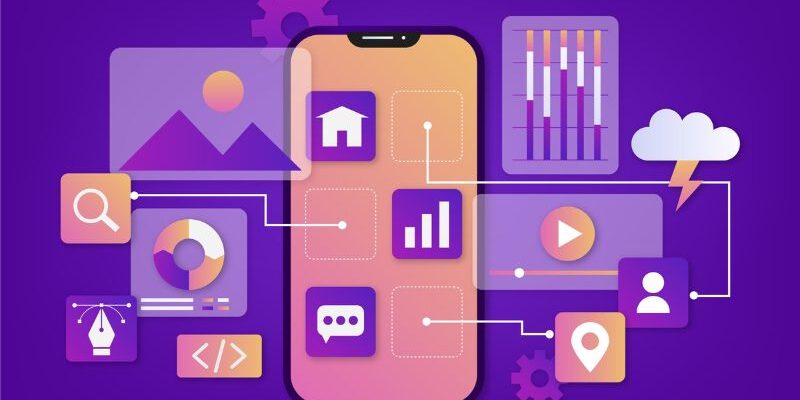
In today’s digital age, mobile apps have become an essential tool for businesses to engage customers, streamline operations, and drive revenue growth. The demand for mobile app development services has surged as enterprises across industries recognize the potential of mobile technology. This comprehensive guide will explore the myriad benefits of mobile app development services, the process involved, and how to select the right development partner to transform your business.

Mobile App Development Services
The Importance of Mobile App Development Services
1. Enhanced Customer Engagement
Mobile apps provide a direct channel to interact with customers. With features like push notifications, personalized content, and seamless communication, businesses can maintain a constant connection with their audience. This leads to improved customer loyalty and retention.
2. Increased Accessibility
Mobile apps offer unparalleled convenience, allowing customers to access services anytime, anywhere. This 24/7 availability translates into increased customer satisfaction and higher chances of conversion.
3. Efficient Operations
Apps can streamline various business operations, from inventory management to customer support. Automated processes and real-time data access reduce the burden on employees, leading to greater efficiency and productivity.
4. Revenue Generation
Monetizing mobile apps through in-app purchases, subscription models, and advertisements provides an additional revenue stream. A well-designed app can significantly boost your financial performance.
5. Brand Strengthening
A mobile app serves as a brand ambassador in users’ pockets. Consistent exposure to your brand through an app helps in building brand recognition and trust.
The Mobile App Development Process
1. Idea and Strategy
The first step in mobile app development is to define the app’s purpose and objectives. Conduct market research to understand user needs, analyze competitors, and identify the features that will make your app stand out.
2. Design and Prototyping
User experience (UX) and user interface (UI) design are critical to the success of your app. Create wireframes and prototypes to visualize the app’s layout and functionality. This stage involves feedback loops to ensure the design meets user expectations.
3. Development
The development phase involves coding the app’s frontend and backend components. Choosing the right technology stack, whether it’s native or cross-platform development, is crucial. Developers must focus on creating a robust, scalable, and secure app.
4. Testing
Comprehensive testing ensures that the app functions as intended and provides a seamless user experience. This phase includes functional testing, performance testing, security testing, and usability testing.
5. Deployment
Once the app is thoroughly tested, it’s time to launch it on app stores like Google Play and the Apple App Store. This step also involves setting up analytics to track user behavior and app performance.
6. Maintenance and Updates
Post-launch, the app requires regular maintenance to fix bugs, improve features, and ensure compatibility with new operating system versions. User feedback is invaluable in guiding updates and enhancements.
Choosing the Right Mobile App Development Services
1. Experience and Expertise
Select a development partner with a proven track record and expertise in your industry. Review their portfolio to assess the quality and diversity of their previous projects.
2. Technical Proficiency
Ensure the development team is proficient in the latest technologies and methodologies. This includes knowledge of various programming languages, frameworks, and development tools.
3. Client References and Reviews
Check client testimonials and reviews to gauge the satisfaction level of previous clients. Direct references can provide deeper insights into the developer’s reliability and professionalism.
4. Communication and Collaboration
Effective communication is key to a successful project. Choose a partner who values transparency, provides regular updates, and is open to feedback throughout the development process.
5. Cost and Timeline
Discuss the project’s budget and timeline upfront. A reputable development service will offer a detailed proposal outlining the scope of work, estimated costs, and delivery schedule.
6. Post-Launch Support
Inquire about post-launch support and maintenance services. A reliable development partner will offer ongoing support to ensure your app remains up-to-date and functional.
Trends in Mobile App Development Services
1. Artificial Intelligence (AI) and Machine Learning (ML)
AI and ML are transforming mobile apps by enabling personalized experiences, predictive analytics, and advanced features like voice recognition and chatbots.
2. Internet of Things (IoT) Integration
IoT integration allows mobile apps to interact with smart devices, providing enhanced functionality and convenience in various domains such as home automation, healthcare, and transportation.
3. Augmented Reality (AR) and Virtual Reality (VR)
AR and VR technologies are being used to create immersive experiences in gaming, retail, education, and more. These technologies can significantly enhance user engagement and satisfaction.
4. Blockchain
Blockchain technology offers enhanced security and transparency for mobile transactions. It’s increasingly being used in apps related to finance, supply chain management, and data verification.
5. 5G Technology
The advent of 5G technology promises faster data transfer speeds and reduced latency, enabling the development of more sophisticated and responsive mobile apps.
Conclusion
Investing in mobile app development services can be a game-changer for your business. By enhancing customer engagement, streamlining operations, and creating new revenue streams, a well-developed app can provide a significant competitive edge. Choose a development partner wisely to ensure the success of your app, keeping in mind their experience, technical skills, and commitment to quality.
For more interesting blogs click here.










